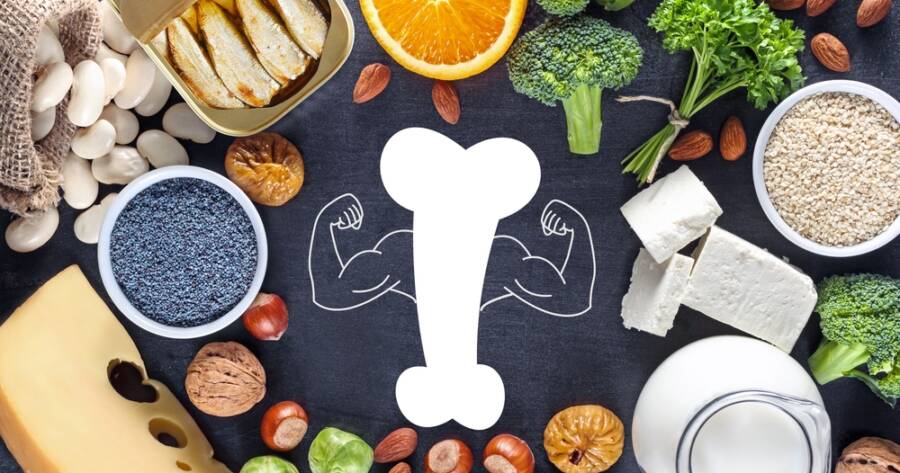Strong bones are essential for a healthy, active life. While factors like age, genetics, and exercise impact bone density, nutrition also plays a pivotal role. Incorporating nutrient-rich foods into your diet can help support your bone health. With this in mind, here are 10 superfoods commonly associated with promoting bone strength and density.
1. Calcium-Rich Dairy Products
Dairy products like milk, cheese, and yogurt are celebrated for their calcium content, a mineral critical to maintaining bone structure. Calcium helps bones remain dense and strong, reducing the likelihood of fractures.
Opt for low-fat or fortified versions for added benefits. While dairy is a reliable source, those who are lactose-intolerant can explore alternatives like plant-based milks fortified with calcium.
2. Leafy Green Vegetables
Spinach, kale, collard greens, and other leafy greens are packed with calcium and vitamin K, both essential for bone health. Vitamin K may play a role in calcium regulation and bone mineralization.
Adding these greens to salads, smoothies, or soups offers a nutrient boost while diversifying your meals. Remember that greens like spinach contain oxalates, which may slightly reduce calcium absorption, so pairing them with other calcium sources is wise.
3. Fatty Fish
Fatty fish such as salmon, sardines, and mackerel are rich in vitamin D, which supports calcium absorption in the body. These fish also provide omega-3 fatty acids, which could have a positive impact on bone density.
Canned salmon or sardines, with edible bones, are especially beneficial as they offer a double dose of calcium and vitamin D. For those who avoid fish, vitamin D-fortified foods or supplements might be alternatives to discuss with a healthcare provider.
4. Nuts and Seeds
Almonds, chia seeds, and flaxseeds are notable for their magnesium and phosphorus content, both essential minerals for bone structure. Magnesium contributes to bone density by converting vitamin D into its active form, helping calcium absorption. Including a handful of nuts or seeds in your daily diet can provide a crunchy, nutrient-packed snack while supporting overall bone health.
5. Fortified Foods
Cereals, plant-based milks, and orange juice fortified with calcium and vitamin D are excellent for people with dietary restrictions or preferences. These fortified foods make it easier to meet daily nutrient needs without relying solely on traditional sources like dairy. Look for labels indicating added nutrients to ensure you’re selecting the right products.
6. Eggs
Eggs are a simple, versatile source of vitamin D, located in their yolks. While they don’t provide as much vitamin D as fatty fish, incorporating eggs into your diet may still support your bone health goals. Pair eggs with other bone-friendly foods, such as sautéed spinach or fortified bread, for a nutrient-dense meal.
7. Beans and Legumes
Black beans, chickpeas, lentils, and other legumes are rich in magnesium, calcium, and zinc, minerals essential for maintaining bone strength. These plant-based proteins are also low in fat and versatile, fitting into various recipes such as soups, stews, and salads. However, some legumes contain phytates, which may interfere with calcium absorption. Soaking or sprouting them before cooking could help mitigate this issue.
8. Sweet Potatoes
Sweet potatoes are a source of magnesium and potassium, both of which contribute to bone health. Potassium helps neutralize acids in the body that can leach calcium from bones, while magnesium supports overall bone structure. Sweet potatoes are also rich in vitamin A, which aids in bone remodeling. Enjoy them baked, mashed, or as fries for a tasty addition to your diet.
9. Berries
Strawberries, blueberries, and raspberries are antioxidant-rich fruits that may support bone health by combating oxidative stress. Although their direct effect on bone density isn’t fully understood, they provide vitamin C, which is essential for collagen production. Collagen forms the framework for bones, so ensuring an adequate intake of vitamin C through berries might contribute to stronger bones over time.
10. Tofu and Tempeh
For those seeking plant-based options, tofu and tempeh are excellent choices. Both are derived from soybeans, a natural source of calcium and isoflavones. Isoflavones are compounds that may support bone density, particularly in postmenopausal women. Check product labels to ensure the tofu is calcium-set for maximum benefit.
Eating for Stronger Bones
Maintaining bone density is a lifelong endeavor influenced by multiple factors, including diet. Incorporating a variety of calcium-rich foods, alongside sources of vitamin D, magnesium, and other supportive nutrients, can help provide a strong foundation for your skeletal health.
While no food guarantees prevention of bone-related issues, the superfoods listed here may complement a healthy lifestyle and reduce risk factors associated with bone loss. As always, consult a healthcare provider or nutritionist for personalized guidance tailored to your dietary needs and health goals.
